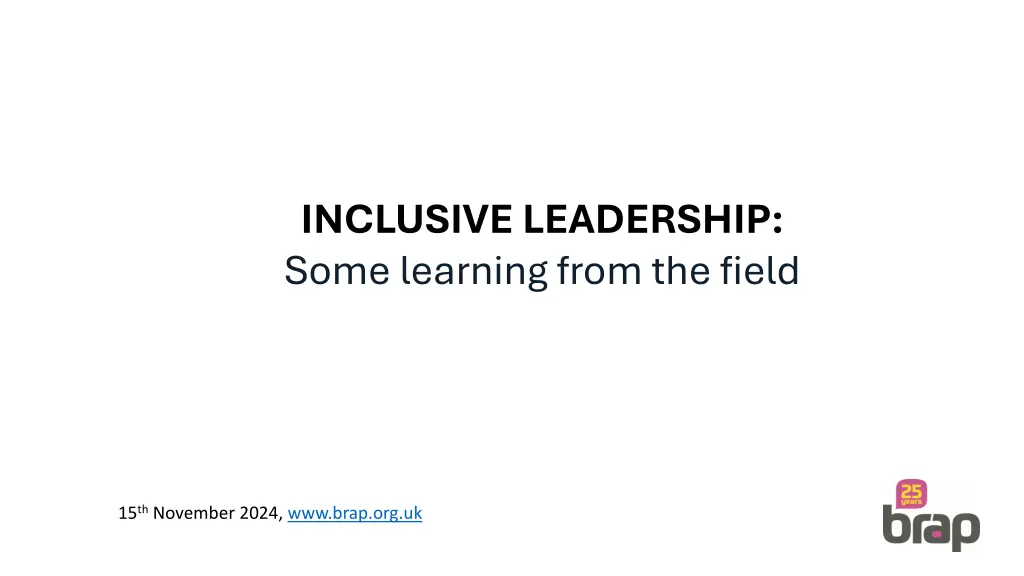
Reflecting on Inclusive Leadership Practices
Gain insights into inclusive leadership practices, representation as a lever for inclusion, and the critical role of leaders in advancing Equality, Diversity, and Inclusion (EDI). Explore the importance of representation in supporting EDI efforts, the unintended consequences of focusing solely on representation, and strategies for fostering a more inclusive organizational culture.
Download Presentation

Please find below an Image/Link to download the presentation.
The content on the website is provided AS IS for your information and personal use only. It may not be sold, licensed, or shared on other websites without obtaining consent from the author. If you encounter any issues during the download, it is possible that the publisher has removed the file from their server.
You are allowed to download the files provided on this website for personal or commercial use, subject to the condition that they are used lawfully. All files are the property of their respective owners.
The content on the website is provided AS IS for your information and personal use only. It may not be sold, licensed, or shared on other websites without obtaining consent from the author.
E N D
Presentation Transcript
INCLUSIVE LEADERSHIP: Some learning from the field 15th November 2024, www.brap.org.uk
Who we are Equalities and human rights charity Based in Birmingham, supporting and working with community groups for 25 years. Also, we have a national remit focused on transforming the way we think about and practice equality Learning & Organisational Development, Research and Evaluation, Community Development We work with 9000+ people a year, providing learning and development support Highly skilled team: researchers, sociologists, psychologists, teachers, mediators, process workers, OD practitioners etc.
Overview Opportunity to critically reflect on inclusion To reflect on the role of representation as a lever for inclusion To think about the critical role that leaders play in progressing EDI
Audience participation How important is representation as a means to support EDI ? Hands up 1) It s critically important EDI won t work without it 2) It can be over-rated what you see isn t always what you get 3) It can be tokenistic and is not a substitute for cultural change
Representation is important Representation has become an important measure of progress for organisations belief that offering opportunities to those previously under-represented means we are becoming fairer / more equitable Workforce Race Equality Standard has helped NHS organisations to understand their progress and to compare themselves to others Involving people from varied backgrounds in leadership positions will improve connection to previously underrepresented groups in the local community
Unintended consequences of focusing on representation in isolation Those who get to represent , often do so at great cost to themselves. E.g. conforming to become accepted as leadership material code- switching / covering and masking difference to fit-in. Leads to negative impact on sense of self (Yoshino 2007). When diverse individuals gain leadership positions they often do so against the odds. Belief that to lead as a diverse individual you have to be exceptional, no room for error. Held to a higher standard. Efforts to increase diverse representation often rely on deficit models focus on leaders to improve / work hard, rather than notice systemic issues (e.g. access to networks) that sustain inequality. Assumption that increasing development opportunities, mentoring, sponsorship is how to improve numbers but we often ignore negative experiences of marginalized staff.
Too Hot To Handle (2024). Not our intention to prove racism The report captures the experiences of staff ( over 1300 ) when trying to raise racism within the NHS It brings together tribunal findings as learning for the NHS in the failings in how they respond to racism Makes recommendations on what the NHS and others can do to be more intentional and to take racism seriously
Take aways All people need to accept their part in making the change Leaders need to be proactive and preventative racism is here - don t wait for individual staff to raise it Needs to be more than policies survey demonstrates the day to day experiences of everyday racism .. Most of which people put up with .. Leaders need to set standards that make people accountable for everyday racism Leaders need to develop comfort with speaking up/ calling out and supporting others to understand and challenge racism
No short cut to culture change for leaders Clarity about concepts of inclusion and representation Belief that looks alone can create change often miss the opportunity to address culture and support those that are systemically marginalized Measures of progress that reflect complexity of how inequality manifests (not just representation) Less focus on activities that seek to upskill ethnically marginalized staff but that leave the culture and systems of the organization intact Leaders need to wrestle with root cause of inequality privileging of particular social categories (e.g. male over female, White over Black ). Develop awareness of how beliefs about race, gender, class are hard- wired into systems. Employ anti-oppressive practice.
Questions? Questions?




